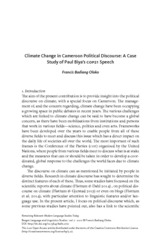Climate Change in Cameroon Political Discourse: A Case Study of Paul Biya's COP21 Speech
Peer reviewed, Journal article
Published version

Åpne
Permanent lenke
https://hdl.handle.net/1956/17838Utgivelsesdato
2017Metadata
Vis full innførselSamlinger
Originalversjon
https://doi.org/10.15845/bells.v7i0.1080Sammendrag
As climate change has occupied a growing space in public debates in recent years, various institutional frameworks have been developed to enable discussion of this issue across areas and borders. The most important of such frames is the Conference of the Parties (COP) organised by the United Nations, where representatives from various fields meet to discuss what is at stake and the measures that can or should be taken to ensure a coordinated global response. In such a framework language and language use are key issues. Informed by the discursive polyphony postulated by Gjerstad (2001), the present paper aims to give an insight into the political discourse on climate change with particular focus on the situation in Cameroon. The speech made by Cameroonian president Paul Biya during the COP21 will serve as an example of how different voices interact within one speech, as well as of the different relations that can be identified between some of these voices and that of the speaker.
